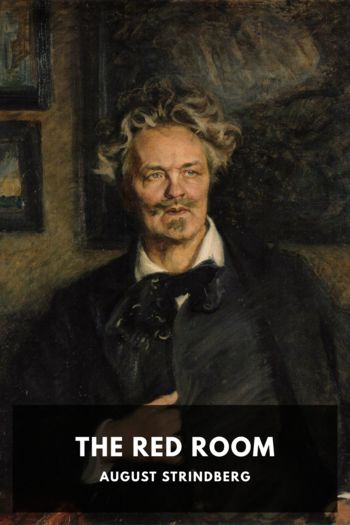The Red Room August Strindberg (best english novels to read txt) 📖

- Author: August Strindberg
Book online «The Red Room August Strindberg (best english novels to read txt) 📖». Author August Strindberg
The individual was discovered, and he was to a high degree endowed with all the characteristics enumerated. He was a strikingly handsome man with a fairly fine figure and a long, wavy beard, hiding all the weak points of his face, which otherwise would have given him away. His large, full, deceitful eyes caught the casual observer and inspired his confidence, which was then unscrupulously abused. His somewhat veiled voice, always speaking words of love, of peace, of honour and above all of patriotism, beguiled many a misguided listener, and brought him to the punch table where the excellent man spent his evenings, preaching straightforwardness and love of the Mother Country.
The influence which this man of honour exerted on his evil environment was marvellous; it could not be seen, but it could be heard. The whole pack, which for years had been let loose on everything time-honoured and venerable, which had not even let alone the higher things, was now restrained and full of love—not only for its old friends—was now—and not merely in its heart—moral and straightforward. They carried out in every detail the programme drawn up by the new editor on his accession, the cardinal points of which, expressed in a few words, were: to persecute all good ideas if they were new, to fight for and uphold all bad ones if they were old, to grovel before those in power, to extol all those on whom fortune was smiling, to push down all those who strove to rise, to adore success and abuse misfortune. Freely translated the programme read: to acknowledge and cheer only the tested and admittedly good, to work against the mania of innovation, and to persecute severely, but justly, everybody who was trying to get on by dishonest means, for honest work only should be crowned with success.
The secret of the last clause which the editorial staff had principally at heart was not difficult to discover. The staff consisted entirely of people whose hopes had been disappointed in one way or another; in most cases by their own fault—through drinking and recklessness. Some of them were “college geniuses,” who in the past had enjoyed a great reputation as singers, speakers, poets or wits, and had then justly—or according to them unjustly—been forgotten. During a number of years it had been their business to praise and promote, frequently against their own inclination, everything that was new, all the enterprises started by reformers; it was, therefore, not strange that now they seized the opportunity to attack—under the most honourable pretexts—everything new, good or bad.
The chief editor in particular was great in tracking humbug and dishonesty. Whenever a delegate opposed a Bill which tended to injure the interests of the country for the sake of the party, he was immediately taken to task and called a humbug, trying to be original, longing for a ministerial dress-coat; he did not say portfolio, for he always thought of clothes first. Politics, however, was not his strong, or rather his weak point, but literature. In days long past, on the occasion of the Old Norse Festival at Upsala, he had proposed a toast in verse on woman, and thereby furnished an important contribution to the literature of the world; it was printed in as many provincial papers as the author considered necessary for his immortality. This had made him a poet, and when he had taken his degrees, he bought a second-class ticket to Stockholm, in order to make his debut in the world and receive his due. Unfortunately the Stockholmers do not read provincial papers. The young man was unknown and his talent was not appreciated. As he was a shrewd man—his small brain had never been exuberantly imaginative—he concealed his wound and allowed it to become the secret of his life.
The bitterness engendered by the fact that his honest work, as he called it, remained unrewarded specially qualified him for the post of a literary censor; but he did not write himself: his position did not allow him to indulge in efforts of his own, and he preferred leaving it to the reviewer who criticized everybody’s work justly and with inflexible severity. The reviewer had written poetry for the last sixteen years under a pseudonym. Nobody had ever read his verses and nobody had taken the trouble to discover the author’s real name. But every Christmas his verses were exhumed and praised in the Grey Bonnet, by a third party, of course, who signed his article so that the public should not suspect that the author had written it himself—it was taken for granted that the author was known to the public. In the seventeenth year, the author considered it advisable to put his name to a new book—a new edition of an old one. As misfortune would have it, the Red Cap, the whole staff of which was composed of young people who had never heard the real name, treated the author as a beginner, and expressed astonishment, not only that a young writer should put his name to his first book, but also that a young man’s book could





Comments (0)